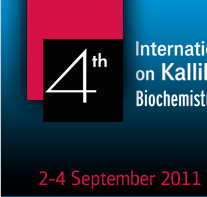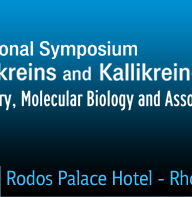|
Tissue Kallikrein and
kallikrein-related peptidases (KLKs),
encoded, in the human genome, by the
largest contiguous cluster of protease
genes, are secreted serine proteases with
diverse expression patterns. They possess
numerous physiological roles, such as the
regulation of blood pressure, hormonal
processing, apoptosis, inflammation,
seminal/skin homeostasis and tissue
remodeling.
The expression of KLK genes is
detected in a broad spectrum of human
tissues where it has been found to be,
mainly, regulated by the steroids
hormones. Many miRNAs have been reported
to comprise targets of the KLKs
genes.
Although primarily known for their
clinical applicability as cancer
biomarkers (e.g PSA/KLK3), recent
evidences implicate KLKs in many pathways
of cardiovascular, renal, skin and neuron
diseases.
Additionally, KLKs were found to be
involved in cancer-related processes,
including cell-growth regulation,
apoptosis, angiogenesis, invasion and
metastasis. KLKs have been shown to
promote or inhibit neoplastic progression,
acting individually and/or in cascades
with other KLKs and proteases and might
represent good targets for therapeutic
intervention. The fact that KLKs represent
targets of miRNAs suggests a
post-transcriptional regulatory mechanism
with further possible therapeutic
applications.
|




